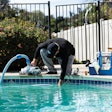
This is a story about change in our industry, which has been occurring slowly for decades, but which has accelerated with the pandemic surge — the consolidation of pool and spa companies.
The process is so common and natural it is referred to as the “maturing” of an industry, making it sound as inevitable as aging, death and taxes. In young industries, many small businesses form rapidly and grow at different rates, some become larger, some stay small, depending on their relative success or inclinations. In general, this is what we’ve seen in the brief history of the consumer- facing part of the industry — some mid-size companies and a few franchisors, working side by side with small businesses and sole proprietors.
However, in the last few years, the process of consolidation has accelerated, as the financial world has awakened to the potential of the pool and spa industry. The pandemic surge of the last 20 months and its economic distortions have only thrown fuel on the fire.
This story focuses on service, the quintessential independent-enterprise sector of the industry. Over the years, it has stubbornly maintained its character as a mix of small business owners, single polers and service departments of mid-size pool and spa companies. But that is changing.
WHY NOW?
Perhaps a better question is: How did the service industry avoid consolidation for so long? That has been the first thought to occur to investor groups stumbling on the service sector in search of targets. It’s actually an attractive enterprise — recession proof, pandemic proof, and let’s face it, no matter what happens there are six million pools here that need to be taken care of, and people aren’t likely to suddenly want to do all that work themselves.
Perhaps it just wasn’t big enough yet to justify the effort. And as anyone who knows and loves the service industry is aware, there’s a certain willful, insular aspect to the group, which might give an investor pause. In any case, it has flown under the radar for many years.
But that status quo changed with the pandemic. Or more accurately, as Hal Denbar, president of the Texas region of National Pool Partners, notes, “The pandemic brought attention to it, but also I think due to the current economic craziness we’re in, there’s a lot of institutional money out there and fewer places to put it. I think some scrappy firms see the potential to move into an industry that hasn’t been touched, and make an investment when it may not have made sense before.”
National Pool Partners (NPP) is a new player in the industry, started by former executives of (pest control giant) Terminix and backed by hundreds of millions of investor dollars. It is consolidating service companies in different U.S. markets; just one of the organizations that are moving to rationalize the service industry.
HOW IT WORKS
It’s certainly nothing new, says Gary Crayton, CEO of Pool Troopers, a consolidator based in the Tampa area. “Consolidation has been going on in parts of our industry for some time. Obviously, we’ve seen it on the manufacturing side, and SCP/ POOLCORP is a big consolidator in distribution, but not much on the service side. In the last five years, there has been a little more franchise activity — Poolwerx and ASP have been working in that space — but there was still only one major acquirer in the service space.”
Crayton’s company, Pool Troopers, grew organically as a stand-alone service business from 6,000 pools in Tampa Bay to 15,000 pools across three states, but had made no acquisitions until the company decided to partner with private equity and take the plunge last year. “We thought in the first full year we might do six deals,” Crayton says, “but things went faster than that. We completed our ninth deal in August.”
Denbar took a little different route, but with roughly the same timeline. He was president of successful Patriot Pool and Spa in Austin when he was approached by Matt Stevenson, former CEO of Terminix, as part of a plan to create a similar, but better home service model in pool care.
Their plan is to buy small service companies and incorporate them into larger regional organizations, each with a size limit of seven to $10 million. “They learned at Terminix that that is sort of the sweet spot for a single service location,” he says. “Bigger than that, and the operation gets sloppier, you start dropping balls.
“But the idea is to get big enough to specialize — to build out teams of technicians that are devoted to start-ups, teams that are devoted to inspection, leak detection, and so on.” Denbar’s Patriot Pool and Spa was a $4 million business — large by service industry standards, “but we didn’t have any dedicated start-up guys. We didn’t have any inspectors. We had people that would do all those things. But now, we’re going to be able to build out career paths where people can become elite at one thing, as opposed to having to be a jack-of- all-trades.
“Not just at a technical level, but at a managerial level, as well. We intend to create positions that, in a small business, because of the expense and time, you just can’t justify.”
And there’s more to it than specialization, says Crayton at Pool Troopers. A larger service organization with greater financial clout can “better manage its fleet, its fuel, its chemical purchasing — all that stuff from a headquarters standpoint.
“Also, as you consolidate in a new market, if you can get two or three or four of these businesses together, now you can tighten up the routes instead of people driving all over a large area. Now your technicians’ days just got shorter, and they’re potentially making more money.”
That’s perhaps the biggest payoff, Crayton adds. He believes there simply needs to be more money and profit in service in order to keep good workers in the pool and spa industry.
“It is a significant issue within our industry,” he says. “We’re competing for technicians that have the talent to go elsewhere — to pest control for instance, down here in Tampa. Or they might go to another route- based business. So we’ve got to be able to pay them competitive wages. But we have a single-pole mentality sometimes in our industry, that goes like, ‘Hey, if you make a paycheck, that’s really good. You’re doing okay.’
“But that’s not really good. We have to make a paycheck and a profit because we have to compete with the Amazons of the world and everyone else for those workers if we want to grow. We have to price with profitability in mind, not just meeting costs.
“Our employees need health insurance and a retirement plan. And a sustainable career path. At 40 or 45 years old, we need to be able to give them other things to do besides work on pools, whether that’s going out and selling jobs or working customer service or in the office.
“We might be paying them a decent wage today, but if they don’t have those things, this isn’t a career for them. And you can’t give your employees those things unless you commit to the industry and create a certain level of profitability within your business.”
EXIT STRATEGIES
None of this works if people don’t want to sell, but in an industry full of entrepreneurs that started companies in the 70s, 80s and 90s, there are definitely some people looking to cash out. AQUA has written a half dozen stories about the travails of senior owners facing the challenge of business succession. Finding a buyer with the requisite cash, experience and inclination can be extremely difficult.
“To many service company owners, a good chance to sell is a relief,” says Denbar. “They think, ‘I’ve built this company, and I want to be rewarded for it. I’ve been looking for that opportunity, so thank you, I’m going to retire.’”
Senior ownership is a target pool for Crayton at Pool Troopers, as well. “Our first acquisition was Portofino Pools of Jacksonville, that’s Jack Manila’s company — a lot of people know Jack (former chairman of APSP). His situation is easily the majority of what we’re seeing, someone looking to retire.”
Exit strategy is a big force in franchising as well, the other big consolidating force in the industry. Stewart Vernon is chief operating officer of ASP, the first big multi-state franchisor in service, which began in 2006. Since that time, through recessions and booms and pandemics, the company has been steadily adding franchises toward its current total of about 130 in 21 states.
“We’ve got guys that come to us at 65 and say, ‘Hey, I want to do this for five years and pass it on to my son or sell it to a younger business partner,” Vernon says. “And we’ve got everyone in between. So having the franchise brand, having our backing, the logo and the websites, professionalism, the systems, training, makes an exit much smoother.”
Like the service companies being purchased by NPP and Pool Troopers, ASP was bought out by a big investment firm and now operates under the parent company, Authority Brands. “We were their first purchase in the swimming pool sector,” Vernon says. “Now, Authority Brands is the second largest home services franchisor behind Neighborly. And it’s been a fascinating model to watch for me, over the past two-and-a-half years now. They wanted me to stay on, keep my team, keep everything the same and grow the company.
“Private equity has definitely become a force in the industry. Over the past few years, we have seen private equity back a couple of our competitive brands, who started franchising over the past seven to 10 years.”
ANXIOUS MOMENTS
The transformation of an industry does not come without some anguish. Many small businesses were created out of nothing, nurtured for years, sweated for, bled for, and the process of transition can be gut-wrenching. They are often like families, and one downside of absorbing a small business into a larger corporate structure is the potential loss of that family business culture. Thus, for an owner facing retirement and the sale of a business, it’s a harrowing experience.
“I think the natural feeling for an owner that has just sold their company, the night before making that company announcement, is overwhelming anxiety,” says Denbar. “’Am I betraying my people? Are they going to think I’m betraying them? Are people going to leave jobs that I’ve worked so hard to build?’ These are the thoughts that can run through your mind.
“But the overwhelming sentiment at every announcement I’ve been to, once we have laid out our plan, has been excitement because of the benefits that we can bring — benefits that I know I couldn’t provide as a small business owner. The health insurance provided to our employees now is less than half the out-of-pocket cost of what I was able to provide before. Free dental. Short-term disability. 401k.
“Still, when I joined NPP, I spent eight months agonizing about the sale of my business, on nightly walks with my wife, thinking, ‘Is this crazy? Is this the best thing we’re ever going to do?’ working through that roller coaster. That experience makes it easy for us to help sellers navigate through that process, because all of us on the management side at NPP have lived it.”
A TIME OF UPHEAVAL
The pandemic has brought unimaginable upheaval to the pool and spa industry, and the full extent of its effects are still being realized. The emergence of the backyard as replacement for public space (the surge) has been the most obvious of these, but it has also wrecked supply lines, transformed purchasing and payment, delivery and distribution, altered the state of relations between employer and employee, between employer and customer, and God knows what else.
Add one more to the list: The pandemic surge has drawn the attention of financiers, whose investments are changing it’s organizational structure from top to bottom.
All growing industries consolidate over time, and for the same reasons. It was only a matter of time before large-scale cash found the fruitful service industry, which we, as industry people, have known for a long time is a rather resilient, dependable cash producer — impervious to recessions, pandemics and even bureaucrats.
There’s no doubting the benefits to consolidation, as this story has made clear. For senior citizen owners looking for a way out, it’s been a blessing. As Denbar points out, “The industry is ripe for it. And we’re seeing that with the action we’re getting from sellers right now.”












































